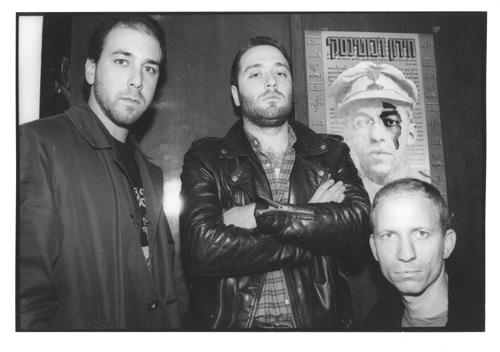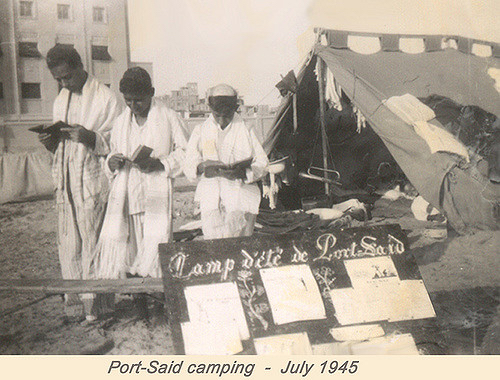Context equals genre. Or so one might surmise, concerning Israeli noise. With labels like Tophet Prophet gaining international recognition, and artists playing to growing audiences, the idiom has touched a nerve. This is a recent development. In the mid-1980s, when ur-band Duralex Sedlex – Latin for “the law [is] harsh, but [it is] the law”– first started, it was in an environment dominated by pop and folk rock.
Mostly the project of musician and artist Ori Dromer, the band was first conceived in 1983, making music that sounds like the bastard child of Einstruzende Neubauten and Cop Shoot Cop, with the art-as-political action mantra of Crass thrown in for good measure. Thematically, Dromer was dealing with issues pertaining to everything from fascism to sex to death, all filtered through the mind of someone who, like many Israelis born in the first two decades following the founding of the state, was inundated with the Holocaust.
There isn’t a lot of information available about Duralex Sedlex, and barely any that isn’t in Hebrew. They released two albums and a slew of singles and tapes independently, and on a couple Israeli labels, (most notably Hed Artzi,) and played shows domestically as well as in Europe. One of the most memorable gigs was in 1992, when the group performed at a site a couple miles away from Auschwitz. Dromer was quoted as saying that the show was “a tribute to life,” according to the leftwing Israeli academic journal תיאוריה וביקורת (Theory and Criticism.)
Except for Dromer, Duralex Sedlex’ lineup was not particularly static, and with it, so was the instrumentation. While some of the songs are the typical guitar, bass, drums of rock music, much of the band’s output included the sounds of metal drums and sheets being banged on as well as synthesizers and tape loops. In an article on Israeli sound art in Haaretz (Breaking the Sound Barrier, Feb. 24, 2010) Dromer said: “”We wanted to make music that wasn’t necessarily melodic, but would speak about physical and psychological experiences that were more extreme or less extreme. We weren’t a rock band but rather an art band. We worked with noise and abstract sounds that have visual value, while the texts dealt with authentic elements of the psyche.”
Most of Duralex Sedlex’s songs were in Hebrew, though a few were written in English. The vocal style is reminiscent of the staccato delivery of Crass, where words are used not just for their meaning but also for how they sound. The lyrics to “Cancer Hallucinations,” one of the English-language songs on their first album “בלי עין רעה” (The Evil Eye,) illustrates this well:
“Yesterday my mother called me/She said you’re already dead dead dead/I chalk myself to death through a mirror every week… every minute… minute/Dead dead dead/Time is not the cure”
The repeated sounds go well with the identity of a band clearly fascinated with fascism and totalitarianism, something which was put forward in the titles of both songs – “שמאל ימין שמאל” (Left Right Left) – and albums – “משפילים עיניים וממשיכים ליראות – משפילים עיניים וממשיכים לירות” (Looking Away and Continuing to See – Looking Away and Continuing to Shoot.)* Duralex Sedlex is interested in fascism in similar ways to European groups like Laibach. While it’s thought of as an outlier, synonymous with Nazi Germany and the like, aspects of fascism can be found in the politics of democracies the world over. Mimicking that in music and art is a way to hold a mirror up to it, and expose fascism for what it really is.
Duralex Sedlex was preoccupied with Israel/Palestine. While it is easy to look at its eighties contemporaries in Europe, and say they were responding to crises of nationalism and democracy in their home countries (the aformentioned Laibach, for example, as well as Crass) it’s much harder to say the same thing about Duralex Sedlex, because of how controversial it remains to say such things about Israeli bands. Referring to them as simply leftist, in spite of their criticisms of Israel, however, would be to overlook the nuances and significance of the band’s work.
An obvious example of how radically things can change in Israel are the actions of late Israeli leader Yitzhak Rabin. Well before winning the Nobel Prize and ultimately being assassinated in 1995 for his efforts in the peace process, he famously issued a command to soldiers to “break the bones” of Palestinian rioters during the first Intifida, in 1987. While it can be argued that Rabin never wanted a true and equal peace, the fact that his beliefs shifted so dramatically is testament to the fluid nature of Israeli politics, where fixed political categories typical to the West are oftentimes meaningless. Hence, the following Duralex Sedlex lyrics:
“From the left they’re stabbing a knife into the back of the state/From the right comes fascism to the aid of the country” – from the track “Left Right Left” (1985)
Further blurring the lines, in 1992 the band did a version of “The Hunchback,” a poem written by rightwing Zionist intellectual Ze’ev Jabotinsky sixty years prior. The words of the poem are a proclamation of political self-importance at a grand level: “Among people I am despised In cultivating the truth—I am the Son of God. And in a frightful night, a night in which I will have to die on the cross like an ancient brother, my student will betray me and renounce me in front of the masses.” This was as much homage to the roots of the Zionist dream as it was absurdist commentary on what it had become.
Outside of Israel the band achieved cult status, with their albums being prized by collectors of extreme music. According to Tom Sveta, who is currently involved in the Israeli noise scene under the name Sinister Sveta, and was a student of Dromer, at art school, Duralex Sedlex is considered to be pioneers of post-punk and industrial music in the country along with others such as 3ח, Plastic Venus, and להקת ישראל (Lehackat Yisrael). Their inclusion on a recent international noise and neofolk compilation on the topic of Zionism and Israel by Topheth Prophet speaks to their place in Israeli cultural history. The collection, which was produced in association with the Israeli Center for Digital Art, included music from controversial British neofolk artist Tony Wakeford (Death in June, Sol Invictus) along with a number of Israeli musicians.
These days Duralex Sedlex rarely play out. Though the band is still technically active, they last performed in 2001. Dromer is focused on his artistic career; he’s noted for his work in plastic and sound. He put out a solo album in 2004 called “בלב הבריכה הנרדמת” (In the Heart of the Sleeping Pool).
* The Hebrew is a play on words that does not have a direct translation to English. The phrase עיניים משפילים is the act of looking away out of embarrassment or degradation and the word ליראות – to see – is pronounced in the same way as the word לירות – to shoot.
Photograph courtesy of Duralex Sedlex






Thanks for running this, much appreciated! Duralex Sedlex needs to be covered in English! Three nitpicking comments: 1) the band didn’t combine industrial/noise with guitar music, but rather changed, overnight to an extent, from playing objects/tapes/machines to playing conventional instruments 2. The association of Rabin to the lyric quote from 1985 is irrelevant as the song was echoing specifically the voices of the religious extreme right of the time 3. Plastic Venus is a band which started in 89/90 therefore not part of the pioneer generation. Oh and the Tophet Prophet compilation is entitled ‘Zion Sky’! Thanks again!